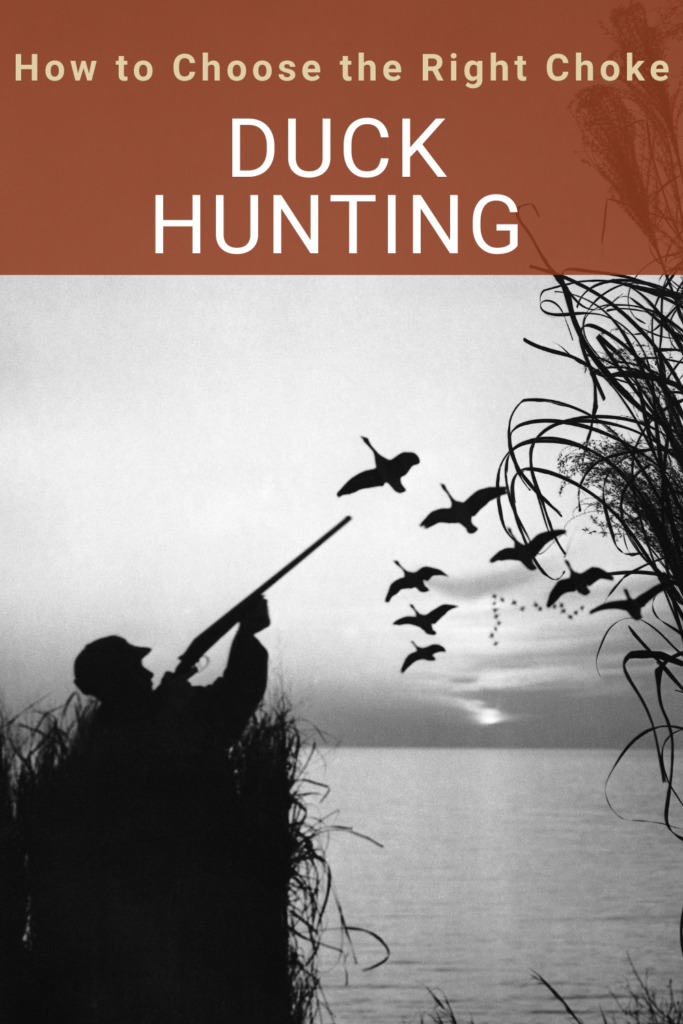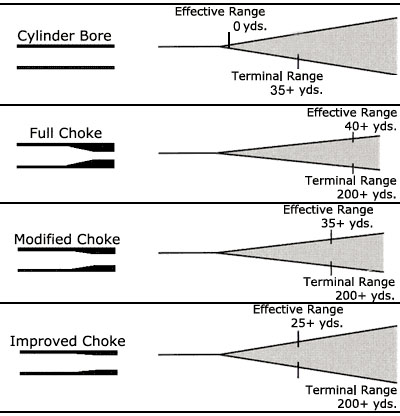Duck hunting is a super thrilling and challenging sport. It requires skill, strategy, and equipment (I have yet to master these!). One of the most essential pieces of equipment for any duck hunter is the choke. A choke is a device that attaches to the end of your shotgun and helps control the shot’s spread. It’s a crucial component that can make all the difference when it comes to hitting your target (and we want some ducks!).
But with so many different types of chokes available, it can be challenging to know which one is right for you. In this article, we’ll explore the different types of chokes and how to choose the right one for your hunting needs. From improved cylinder to full choke, we’ll cover everything you need to know to ensure your success in the field. So, if you’re ready to take your duck hunting skills to the next level, read on and discover how to choose the perfect choke for your shotgun.

Understanding what a choke is and how it affects your shot:
Before we dive into the different types of chokes, it’s essential to understand what a choke is and how it affects your shot. A choke is a tapered constriction at the end of your shotgun barrel that controls the spread of the shot as it exits the muzzle. The tighter the constriction, the more the shot will stay together, resulting in a denser pattern. A looser constriction will result in a wider spread, which is ideal for close-range shots. Why did this take me so long to understand?!
Duck Hunting Without a Dog: Tips, Techniques & Strategies
The choke you choose will depend on the type of hunting you’re doing, the distance of your shots, and your personal shooting style. If you’re hunting in a smaller area with shorter shots, you may want a more open choke to ensure you don’t miss your target. If you’re hunting in a larger area with longer shots, a tighter choke may be necessary to ensure you hit your target.
It’s important to note that chokes do not increase the range of your shotgun. They only control the spread of the shot, which can be beneficial in certain situations. Understanding how chokes work and how they affect your shot is the first step in choosing the right one for your hunting needs.
Types of chokes and their characteristics:
There are several types of chokes available, each with its own unique characteristics. Here are the most common types of chokes and what they do:

Cylinder
A cylinder choke has no constriction and is essentially a straight tube at the end of your shotgun barrel. This type of choke is best for close-range shots, as it allows the shot to spread quickly. Cylinder chokes are ideal for shooting ducks within 20 yards, making them a popular choice for hunting over decoys.
Improved Cylinder
An improved cylinder choke has a slight constriction and is ideal for shots up to 25 yards. This type of choke allows for a slightly denser pattern than a cylinder choke, making it ideal for longer shots. Improved cylinder chokes are a good choice for hunting ducks in a variety of situations, including over-decoys and in open water.
Modified
A modified choke has moderate constriction and is best for shots up to 30 yards. This type of choke provides a denser pattern than an improved cylinder choke, making it ideal for longer shots. Modified chokes are a popular choice for hunting ducks in open water or over decoys.
Full
A full choke has a tight constriction and is best for shots up to 40 yards. This type of choke provides the densest pattern of all chokes, making it ideal for long-range shots. Full chokes are a popular choice for hunting ducks in open water or over decoys.
Extra Full
An extra full choke has an even tighter constriction than a full choke and is best for shots beyond 40 yards. This type of choke provides the densest pattern of all chokes, making it ideal for the longest-range shots. Extra full chokes are a popular choice for hunting ducks in open water or over decoys.
Want a free printable checklist to have on hand before your next waterfowl hunt? Download it now.
Factors to consider when choosing the right choke:
When choosing the right choke for your hunting needs, there are several factors to consider. These include the distance of your shots, the shot size you’re using, and your personal shooting style.

Distance
The distance of your shots will play a significant role in determining the right choke for your shotgun. If you’ll be taking shots at close range, a cylinder or improved cylinder choke may be the best choice. If you’re taking longer shots, a modified or full choke may be necessary. It’s important to choose a choke that matches the distance of your shots for the best results.
Shot size
The shot size you’re using will also play a role in determining the right choke for your shotgun. Smaller shot sizes, such as #7 or #8, will require a more open choke to ensure a dense enough pattern. Larger shot sizes, such as #2 or #4, will require a tighter choke to ensure the shot stays together at longer distances.
Shooting style
Your personal shooting style will also play a role in determining the right choke for your shotgun. If you tend to shoot quickly and instinctively, a more open choke may be best for you. If you take your time and aim carefully, a tighter choke may be necessary.
Smoked Duck: Recipes, Tips, and Techniques for Delicious Results
Testing and experimenting with different chokes:
The best way to determine the right choke for your hunting needs is to test and experiment with different chokes. Most shotgun manufacturers offer a variety of chokes that can be easily swapped out, allowing you to try different options. Start by selecting a choke that matches the distance and shot size of your typical hunting situation, then test it out at the range. Take note of the pattern and adjust as necessary until you find the right choke for your needs.
Maintenance and care for your chokes:
Proper maintenance and care for your chokes are essential to ensure they continue to function properly. After each use, remove the choke from your shotgun and clean it thoroughly with a solvent and brush. Inspect the choke for any signs of damage, such as cracks or pitting, and replace as necessary. Store your chokes in a dry, cool place to prevent rust and corrosion.
Common mistakes to avoid when choosing a choke for duck hunting:
When choosing a choke for duck hunting, there are several common mistakes to avoid. These include:
– Choosing a choke that’s too tight for your distance and shot size
– Choosing a choke based solely on personal preference, rather than matching it to your hunting situation
– Failing to test and experiment with different chokes to find the right one for your needs
– Neglecting to properly maintain and care for your chokes
By avoiding these common mistakes, you can ensure you choose the right choke for your hunting needs and maximize your chances of success in the field.
Recommended chokes for popular duck hunting shotguns:
When it comes to choosing the best brands for duck hunting chokes, several reputable manufacturers produce high-quality chokes designed specifically for waterfowl hunting. Some of the top brands to consider include:
- Carlson’s Choke Tubes: Carlson’s offers a wide range of choke tubes designed for various shotgun models and hunting scenarios. They are known for their precision machining and durable construction.
- Patternmaster: Patternmaster is renowned for its innovative chokes that are engineered to produce tight and consistent shot patterns. They are particularly popular among waterfowl hunters.
- Briley: Briley is known for its high-quality choke tubes, and they offer a variety of options suitable for duck hunting. Their chokes are prized for their performance and durability. You can find these directly on the Briley website.
- Trulock Chokes: Trulock manufactures chokes that are known for their tight patterns and reliability. They offer a range of chokes suitable for different hunting situations.
- Kicks Industries: Kicks produces specialized waterfowl chokes designed to deliver consistent patterns and effective shot placement. They are favored by many duck hunters.
- Beretta: If you own a Beretta shotgun, consider their factory-made chokes. Beretta offers a range of choke options that are specifically designed for their shotguns and can perform excellently in the field.
- Browning: Browning is another shotgun manufacturer that offers factory-made chokes. They provide a variety of choke options for different shotgun models, including those suited for waterfowl hunting. You can find these directly on the Browning website.
Remember that the best choke for your duck hunting needs may depend on factors such as the specific shotgun you’re using, the type of ducks you’re hunting, and your shooting preferences. It’s essential to experiment with different choke tubes and patterns to find the one that suits you best in various hunting situations.
Commonly asked questions about chokes for duck hunting:
What choke is best for duck hunting?
For duck hunting, a modified choke is often recommended. It strikes a balance between pattern spread and density, suitable for varying distances encountered during duck hunting.
What choke is best for duck hunting 20 gauge?
For 20-gauge shotguns used in duck hunting, an improved cylinder choke is a good choice. It provides a slightly wider pattern, which is beneficial for closer shots typically encountered while waterfowl hunting.
What is the best choke for dove and duck?
A modified choke is commonly used for both dove and duck hunting. It accommodates the different shooting distances encountered in these two types of hunting scenarios, offering versatility in pattern distribution.
What kind of choke is a waterfowl choke?
A waterfowl choke is specifically designed to provide effective patterns for waterfowl hunting, including ducks and geese. These chokes often offer tighter constriction to ensure dense patterns, making them suitable for longer shots in wetland environments.
Conclusion and final thoughts on choosing the right choke for duck hunting:
Choosing the right choke for your duck hunting needs is essential to maximize your chances of success in the field. By understanding the different types of chokes and their characteristics, considering factors such as distance and shot size, and testing and experimenting with different chokes, you can find the perfect fit for your shotgun. Proper maintenance and care for your chokes and avoiding common mistakes can also help ensure your success in the field. So, take the time to choose the right choke for your needs and enjoy a successful and satisfying duck hunting experience.





One thought on “How to Choose the Right Choke for Duck Hunting”